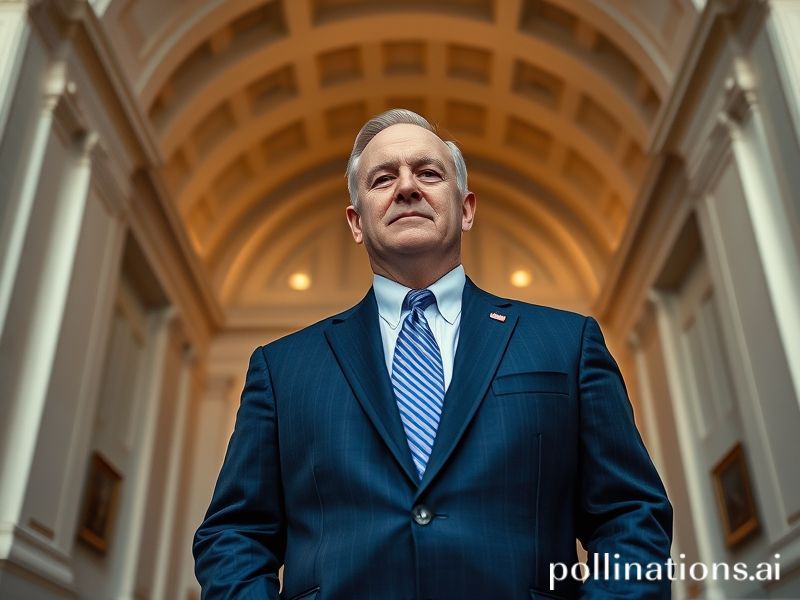Mark Kelly: The Senator Who’s Seen Earth From 400km Up and Still Can’t Fix Arizona
Mark Kelly and the Terrifying Luxury of Orbital Perspective
Dave’s Locker – International Bureau
The first thing you notice when interviewing people who have left Earth is that they all return with the same smug serenity of someone who’s found the cheat-code to existence. Astronaut-cum-senator Mark Kelly is no exception. While the rest of us down here bicker over gas prices like medieval peasants arguing about turnip tariffs, Kelly calmly explains that once you’ve watched the planet spin beneath you at 17,500 mph, the phrase “cost of living crisis” feels quaint—like worrying about the upholstery while the Titanic is already half-submerged.
Kelly, of course, is the American who rode rocket boosters for NASA, then rode the anti-Trump wave straight into the U.S. Senate from Arizona, a state that still can’t decide whether it wants to be the next Silicon Valley or the next Mad Max set. His twin brother Scott spent a year in space as a human lab rat; Mark spent 54 days in orbit and, more impressively, 19 years married to Gabby Giffords, the congresswoman who survived a point-blank assassination attempt and still smiles like she knows the punchline the universe forgot to tell the rest of us. Between them, the Kelly-Giffords household has endured gun violence, congressional gridlock, and Russian toilets that back up in zero-g—proof that marital vows now include “for low-Earth orbit or poorer.”
The international press loves a tidy metaphor, so here it is: Kelly is the living bridge between the International Space Station and the International Space of Legislation. While Moscow threatens to drop the ISS into the Pacific like a disused shopping trolley, Washington wrings its hands over semiconductor supply chains. Kelly, meanwhile, sits on the Senate Armed Services Committee murmuring, “I’ve seen Beijing at night—those lights aren’t just pollution, they’re power.” Translation: the next war might be fought with satellites and microchips, but it will still be narrated by whichever politician has the best view from the window seat.
Europe watches this American astronaut-politician hybrid with the same wary fascination it reserves for deep-fried butter at state fairs. The European Space Agency has no equivalent figure—no Italian senator who once docked with Mir, no French MEP who has eaten freeze-dried coq au vin. Instead, the Continent outsources its existential dread to philosophers and its launch capability to French Guiana, which is like hiring your cousin to drive the getaway car because he once owned a scooter. Kelly’s presence in the Senate thus serves as a daily reminder that when the U.S. sneezes in orbit, the EU catches the flu in Strasbourg.
Global South countries view Kelly less as astronaut-statesman and more as imperial sky-voyager. To them, the ISS is a $150 billion clubhouse where dues are paid in dollars, rubles, or yen, but never in pesos or rupees. When Kelly tweets photos of cyclones churning above the Philippines, Filipino disaster managers nod politely while calculating how many typhoon shelters those pixels could have funded. The irony is not lost on anyone: the higher humanity climbs, the steeper the ladder looks from below.
China, naturally, has its own narrative. The state-run Global Times calls Kelly “a relic of unilateral space dominance,” which is propaganda-speak for “guy who can still outmaneuver us in a dogfight over the Kármán line.” Beijing’s Tiangong station is currently crewed by taikonauts who practice rendezvous protocols with the same enthusiasm teenagers reserve for TikTok dances. Kelly’s advice to the Pentagon—delivered in clipped astronaut cadence—is to stop worrying about hypersonic gliders and start worrying about hypersonic bureaucracy. Paperwork, he notes, travels faster than any warhead.
Back on the Hill, Kelly’s bipartisan gun-safety bill is named after his wife, because nothing says “American politics” like turning personal tragedy into legislative branding. The international community applauds politely, then checks its own firearm statistics and quietly schedules another school-shooting drill. Meanwhile, the ISS continues its 90-minute orbits, each sunrise a reminder that somewhere, a senator who has seen the curvature of the Earth is voting on farm subsidies he could once spy from 400 kilometers up.
So what does Mark Kelly mean to the world? He’s the rare politician who can cite orbital mechanics during a filibuster and still sound like the adult in the room. He’s proof that humanity can build a laboratory in the sky but can’t fix a pothole in Phoenix without a 17-month feasibility study. And he’s a walking, talking rebuttal to anyone who still believes the view from space makes you a better person; it only makes you a better witness to the mess we’ve made down here.
Conclusion: In the end, Kelly’s greatest contribution may be unintentional: he reminds every nation that looking down from orbit doesn’t grant moral clarity—just a clearer view of the chaos. And if that’s not the most democratic sight imaginable, then perhaps we deserve the gravity we insist on keeping.







